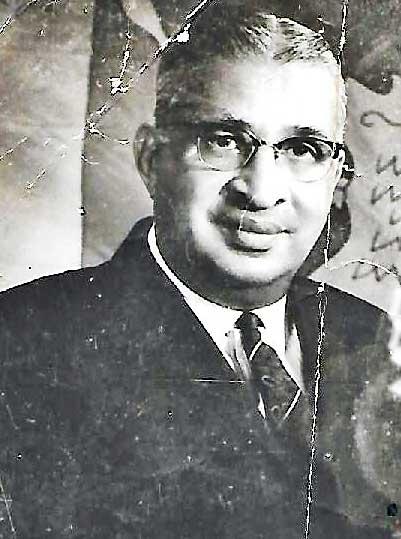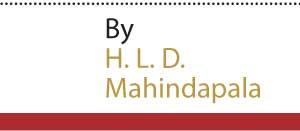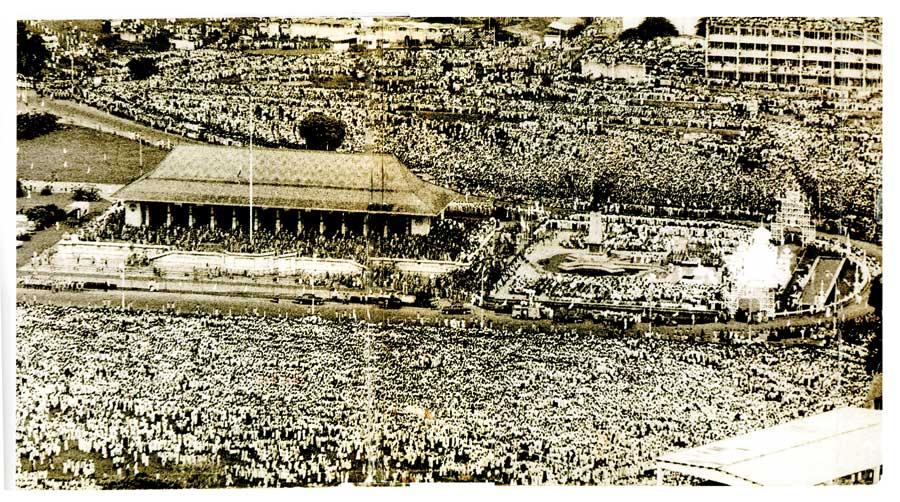Reply To:
Name - Reply Comment
Last Updated : 2024-04-19 05:41:00
Today is Dudley Senanayake’s 109th birth anniversary
Of all the leaders who battled in the political arena to win power and retain power in the post-independent era,  Dudley Senanayake stands out as a unique figure, towering way above the rest. It is difficult to find another leader who has played power politics with such finesse.
Dudley Senanayake stands out as a unique figure, towering way above the rest. It is difficult to find another leader who has played power politics with such finesse.
It is the humane and democratic niceties he maintained at all times that made him the exceptional gentleman of politics. He is the kind of leader that creates nostalgia for the times that were dominated by intellectual and moral giants who’ gave their best in serving the people. Their performances on the public stage too were admirable and respectable. As with other political giants of his time, Dudley’s stage was the Old Parliament - the one with the classical Ionic pillars at the city end of Galle Face Green.
It was a star-studded ring where the best and brightest sparkled in the cut and thrusts of verbal duels. Whether as Leader of the Opposition or Prime Minister Dudley was always pitted against colossal figures like Dr N. M. Perera, Dr Colvin R. de Silva, Pieter Keuneman, G. G. Ponnambalam. S. J. V. Chelvanayakam - all of whom would have been exemplary representatives of the people adding stature and respect to any parliament.
Upholding parliamentary decorum was one of the primary missions of party leaders. For instance, Dudley had only to look back from the front row at the noisy or unruly backbenchers to quieten them. There were, of course, the usual cross-talks where member on opposite sides would clash head-on. But in the end, when the heat dies down they resume their normal relations as if nothing had happened.
Dudley was a stickler for principles. It was his code of ethics that endeared him to his friends and foes. His politics ran parallel to that of the principles laid down in the Mahavamsa - the classic hardly read by our political pundits.
In it, historian Mahanama states categorically that the mission of the king/state was “to make our island a fit  dwelling-place for men”. (MV - 1:44). This short and sweet statement summarises the overall purpose and meaning of the state. The Mahavamsa, though it was written to delineates the history of the Sinhala-Buddhists, does not state that the state is for the-Sinhala-Buddhists only, as distorted by the hired hacks in academia.
dwelling-place for men”. (MV - 1:44). This short and sweet statement summarises the overall purpose and meaning of the state. The Mahavamsa, though it was written to delineates the history of the Sinhala-Buddhists, does not state that the state is for the-Sinhala-Buddhists only, as distorted by the hired hacks in academia.
In clear and unequivocal terms, it declares that the function of the state is “to make our island a fit dwelling-place for men”, meaning all human beings, irrespective of caste, creed, or religion. All states should be organised and driven to achieve this ideal. Taking it further, it can also be argued that this simple statement encapsulates the principles encoded in the UN Charter: making our planet a fit-dwelling place for men.
Historian Mahanama also declared emphatically that “the king (state) is appointed mindful of the good of all” (MV - IV:7). King Elara earns his respected place in the Mahavamsa for “ruling with even justice toward friend or foe, on occasions of disputes at law.” (MV - XXI: 14). One noteworthy instance highlights the role of a minister who acts according to the rule of law, defying even the authority of the king. The Mahavamsa says: “The high minister, known to be just, who decided (the matter) excluded him (i.e., the offending monk found guilty), according to right and law, from the order, albeit against the king’s wishes.” (MV - XXXVII: 39).
When putting together, the basic principles of “making our island a fit-dwelling place for men”, “mindful of the good of all” with “even justice toward friend and foe”, “according to right and law, albeit against the wishes of the king/state”, add up to a comprehensive political philosophy on which democracies are established in contemporary times.
Each one of these principles taken separately could be equated with the foundational principles/theories of liberal democracies that emerged in the post-French Revolution period of Enlightenment.
The principles outlined in the Mahavamsa also accords with Asokan ideal of governance. In broad outline, the Mahavamsa rated these principles as the highest noble values that accords with the ideals of a Buddhist state. These are principles that were laid down in the 5th century - long before modern political thinkers elaborated these fundamentals into sophisticated theories. The concept of universality embracing all of humanity and the compassion that runs through its pages with a sense of justice to all is an outstanding feature of the Mahavamsa.
Our academics, hired to deride the Mahavamsa in the air-conditioned NGO seminars, have yet to discover the ennobling principles that produced a Siri Sangabo - the ultimate symbol of the principle that the power of the king (state) is to serve the needs of the people. The ideal state should consistently prioritise the needs of the people over and above the self-serving needs of the power-hungry king. Siri Sangabo, in adhering to the Buddhist principles (Asokan ideal), came nearest to the ideal kingless state.
"The Senanayakes made the UNP transform our island (into) a fit dwelling-place for men. When they designed the multi-coloured national flag with the consent of all community leaders they signalled that the island belongs to all. If the Father laid the foundations for democracy the son reinforced it"
This is not an attempt to equate Dudley with Siri Sangabo. But in terms of not being obsessed with power, or using power to serve self-interests at the expense of the people, or hanging on to power at any cost, particularly when the king is not wanted, Dudley came closest to the principles upheld by Siri Sangabo. Often he threatened to give up politics and take to the robes. Power came easily to him first from his father and then from the people. When after his father died in 1952 the Opposition criticised him for jumping into his father’s seat with his manipulations and patronage he went to the polls and the swept the board.
Pieter Keuneman once told me that they found it difficult to undercut Dudley’s appeal to the people. The only way they could attack him was by making him look like a puppet of “JR” - the Yankee Dickie whose image was linked to the West as opposed to the nationalist Senanayakes who were in the forefront of the anti-British campaign from the time of the 1915 Sinhala-Muslim riots.
The Senanayake name had roots in the Sinhala- Buddhist nationalism which JR didn’t. It was easier to attack Dudley’s image by linking his name with JR. So their slogan was: “Dudley anda uda. JR anda yata”. (When Dudley is on top of the bed, JR is under that bed”.)
None of the Marxists who claimed to be the genuine representatives of the poor and the working class could get anywhere near the popularity of Dudley. With their working-class programmes, the Left leaders were connected mainly to the workers in the urban areas.
The Senanayake network ran far and wide into the villages with their agricultural and Sinhala-Buddhist credentials. From the days he was the Minister of Agriculture Dudley had worked closely with the settlers in the East (Gal Oya) and the North Central dry zone.
I remember the evening we raced to Padaviya from Anuradhapura. I was embedded with him as the Lake House correspondent covering his 1960 election campaign, shortly after the death of S. W. R. D. Bandaranaike. After the Anuradhapura meeting, he was due to address the last meeting of the day in Padaviya.
He was late. He told his driver, Simon, to get to the back and took the wheel. He was a speed maniac. My heart would quail each time he took his hands off the wheel to acknowledge with folded hands held high the greetings of the people lined up on the bends in the steep hills. Simon and I were his only companions on the road most of the time. I lived with him during those three months.
On this particular evening, we arrived in Padavaiya at fading twilight thanks to his driving. When he got out there was pandemonium with adoring crowds surrounding him. Practically all of them were farmers who had been settled in the land by either his father or himself. Some were falling at his feet and worshipping him.
At this point, he lost his cool. He grabbed a man who was prostrating before him and yelled: “Appuhamy, mama kiyala thee-yen-ewa neda mata vadinta epai kiyala. Mama hamu-duru kenek-da?” (Appuhamy, haven’t I told you not to worship me. Am I a Buddhist monk?”) He had an elephantine memory and he seldom forgot the details.
When I recall that incident now I find it very difficult to endure the TV images of our politicians allowing school children to worship them as if the kids are serfs who should pay homage on bended knees to their lords
and masters.
The new parliament should pass laws to prevent such humiliation. Our children should be taught to stand up straight with dignity before any man and not bend as slaves before the jetsam and flotsam that floats across the Diyawanna Oya and slips into Parliament.
It was the respect he gave his people that was rewarded when he passed away. The winding queues that went halfway around the city to pay him their last respects day and night, moved solemnly as an unprecedented show of affection for a leader that upheld and served with humility the virtues enshrined in their tradition.
The Senanayakes were firmly rooted in the sacred soil of the land. They did no go to kiss the cheeks or the hems of Western skirts. They would never have passed resolutions condemning our soldiers, to appease foreign masters. They served the aspirations of the people not the interests of alien Big Brothers or imported theories touted by weirdos in academia and NGOs.
The Senanayakes made the UNP transform “our island (into) a fit dwelling-place for men”. When they designed the multi-coloured national flag with the consent of all community leaders they signalled that the island belongs to all. If the Father laid the foundations for democracy the son reinforced it. As the first two founders of the nation, they paved the way for their successors to build on it. The fact that the foundation stone they laid still stand solidly, though a bit shaken, is testimony to their vision and their faith in the people.
Today, more than ever, Dudley Senanayake is most relevant to the UNP. He never lost his grip on the Party leadership though he too faced the first big split in the Party. It was a struggle between two of the giants in the Party. Due to my closeness with Dudley, I too got caught in the forces that had divided the Party into two camps - Dudley’s and JR’s.
The Lake House, which was the Power House of the day, too was divided into two camps. Editor of the Daily News, Ernest Corea and Esmond Wickremesinghe, the father of Ranil, were with “JR”. Denzil Peiris and I were with Dudley.
Despite all the divisive forces raging inside Siri Kotha the Party held together. Dudley held the leadership solidly in his hands. It never came down to the current divisions that had virtually dismantled the Grand Old Party into two self-destructive fragments.
The saving grace is that the names of the Senanayake’s will reverberate down the corridors of time for those who would write the next chapters of the Mahavamsa.

A nation outpouring of grief
anonymous Friday, 19 June 2020 07:27 PM
I was there. No human being in Sorry Lanka will get that sort of a goodbye ever. Not even in a million years. Come back if you can your Honour.

Add comment
Comments will be edited (grammar, spelling and slang) and authorized at the discretion of Daily Mirror online. The website also has the right not to publish selected comments.
Reply To:
Name - Reply Comment
On March 26, a couple arriving from Thailand was arrested with 88 live animal
According to villagers from Naula-Moragolla out of 105 families 80 can afford
Is the situation in Sri Lanka so grim that locals harbour hope that they coul
A recent post on social media revealed that three purple-faced langurs near t